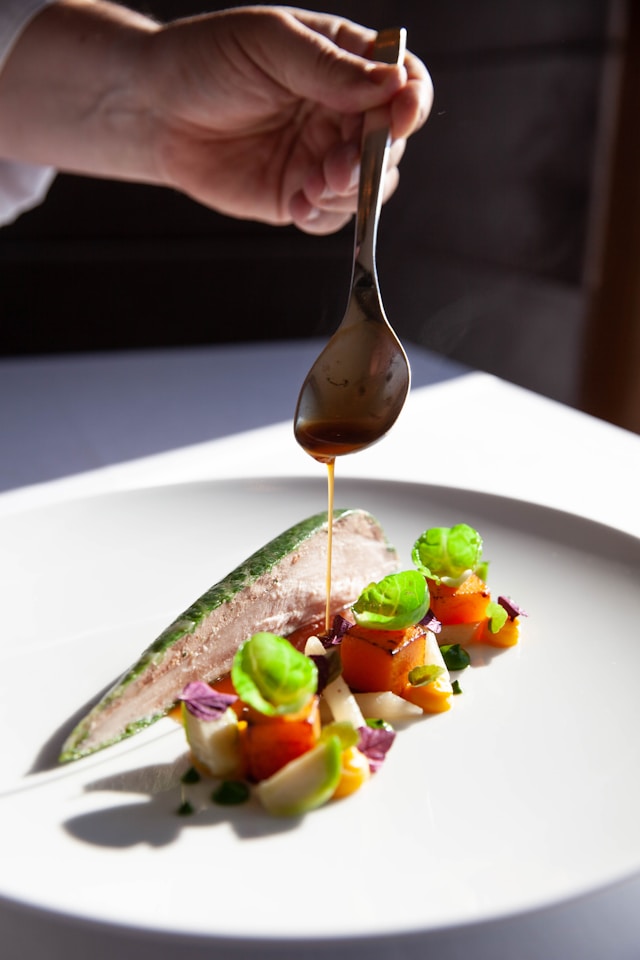The popularity of plant-based culinary arts has increased as more people adopt sustainable, better eating practices. In the US, there are a plethora of educational opportunities available to aspiring cooks who wish to specialize in this area. Comprehensive plant-based culinary arts programs are available both on campus and online through Auguste Escoffier School of Culinary Arts and many other similar schools.
These courses equip students with the fundamental skills needed for cooking, the ability to innovate recipes, and commercial knowledge specific to the plant-based food sector. Students gain experience in preparing complete foods, making gluten- and dairy-free substitutes, and mastering the technique of striking a balance between flavor and nutrition. A lot of courses also focus on sustainability techniques, which is in line with the rising demand for food preparation that is considerate of the environment.
The emphasis on fruits, vegetables, nuts, legumes, whole grains, and plant proteins in Escoffier’s plant-based cooking classes sets them apart. These courses give students the information and abilities they need to take the lead in the rapidly changing food industry and set them up for success in a variety of culinary environments.
Key Takeaways
- Programs for plant-based cooking provide in-depth instruction in environmentally friendly and health-conscious cooking methods.
- Students learn how to create inventive plant-based meals and obtain practical experience through externships.
- Programs that support a variety of learning styles and professional objectives are offered both on campus and online.
Pioneering Plant-Based Culinary Schools
In response to the increasing demand, a number of culinary schools now provide specialist plant-based curricula. These courses offer thorough instruction in sustainable practices, nutrition, and plant-based cooking methods.
Plant-Based Curriculum and Degree Options
An excellent place to start if you have a strong interest in plant-based cuisine and want to make it your career is with specialist programs in plant-based culinary arts. With an emphasis on vegan, vegetarian, and sustainable cooking methods, several prestigious culinary schools now provide plant-based curricula and degree alternatives. These schools are notable for having extensive plant-based curricula:
- Auguste Escoffier School of Culinary Arts – Plant-Based Culinary Arts Diploma
Escoffier provides an associate degree and online diploma in plant-based culinary arts. For students who want to specialize in vegan food, the curriculum’s coverage of plant-based culinary methods, recipe development, sustainability, and farm-to-table practices is perfect.
- Institute of Culinary Education (ICE) – Plant-Based Culinary Arts & Food Operations diploma
A full-time diploma program in health-promoting, plant-based culinary arts is available at ICE’s Natural Gourmet Center. In order to support students in creating creative plant-based dishes, the curriculum includes classes on plant-forward techniques, seasonal cuisine, sustainability, and nutrition.
- Rouxbe Online Culinary School – Plant-Based Professional Certification
A professional certification program in plant-based cooking methods is available online through Rouxbe. With flexibility for students, this self-paced course delves deeply into vegan and vegetarian food preparation, kitchen skills, and recipe development.
- Living Light Culinary Institute – Plant-Based Chef Certification
Living Light offers a variety of certification programs in raw and plant-based culinary arts. Its curriculum is ideal for students who want to specialize in plant-based cooking, as it places a lot of emphasis on nutrition, sustainable methods, and knowledge of raw, vegan, and organic foods.
These educational institutions offer exceptional chances to acquire specific knowledge in plant-based culinary arts, assisting you in establishing a prosperous career in the expanding vegan and vegetarian food sector.
Culinary Foundations and Skill Development
Programs for plant-based cooking impart fundamental skills that are useful in all types of cooking. Students pick up:
- Knife skills
- Cooking methods (roasting, sautéing, braising)
- Food safety and sanitation
- Ingredient knowledge and sourcing
- Recipe development and menu planning
- Nutritional principles
In order to get practical experience, programs frequently incorporate externships and hands-on cooking instruction. A lot of them also provide business and management courses to help graduates prepare for a variety of job options.
Funding Your Education
Culinary schools typically offer various financial aid options to help students fund their education. These may include:
- Federal and private student loans
- Scholarships based on merit or need
- Work-study programs
- Payment plans
Students should research and compare financial aid packages when considering different programs. Many schools have financial aid offices to assist with navigating funding options and application processes.
Advancing Careers with Specialized Training
Plant-based culinary programs offer comprehensive training to prepare students for successful careers in the evolving food industry. These programs focus on developing practical skills, business acumen, and an understanding of nutrition and wellness.
Experiential Learning and Externships
In culinary education, practical experience is essential. Industry externships are a common feature of plant-based culinary programs, giving students the chance to put their knowledge to use in practical situations. These externships offer insightful experiences with industry procedures, professional kitchens, and a variety of cooking methods.
Students gain knowledge of menu formulation and planning by working alongside seasoned chefs. They gain knowledge on how to use fruits, vegetables, legumes, nuts, and whole grains to make creative plant-based meals.
Additionally, internships assist students in developing their professional networks and investigating career options in culinary product creation, restaurants, and catering services.
Choosing a U.S. Plant-Based Culinary Program
In the US, plant-based culinary arts education is growing at a very quick pace. There are currently several ways for aspiring chefs to become knowledgeable in this expanding industry. Programs at reputable culinary schools are available online and on campus, ranging from diplomas to associate degrees.
Expect practical instruction in sustainable food practices, recipe development, and plant-based culinary methods. In order to prepare graduates for successful professions, many programs also include externships and business skills. Formal training in this area can lead to new chances in the culinary world as customer demand for plant-based cuisine continues to surge.





